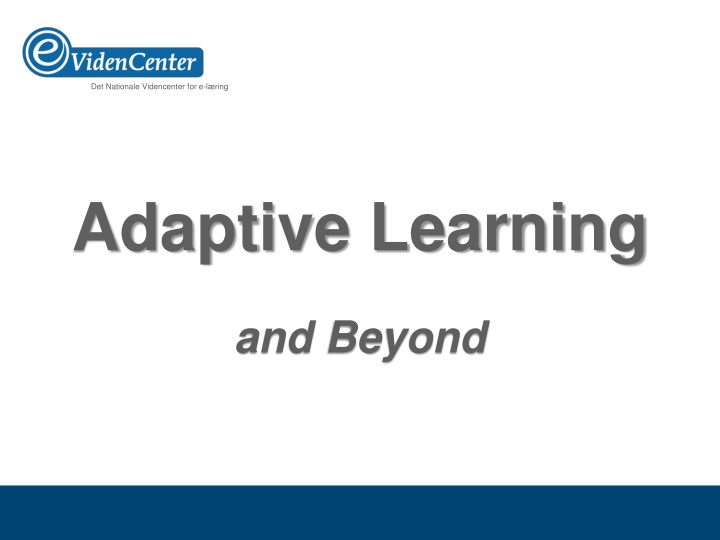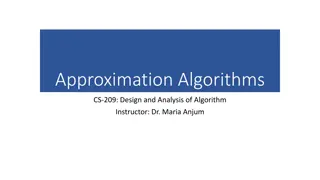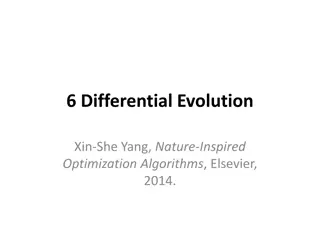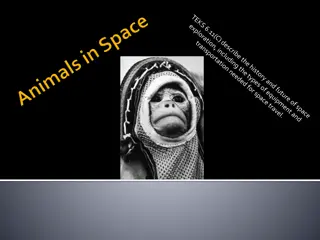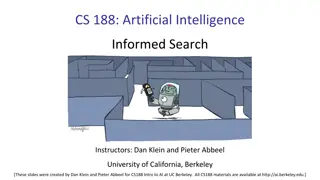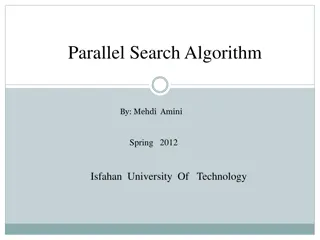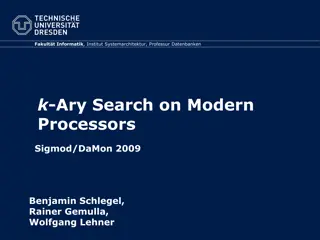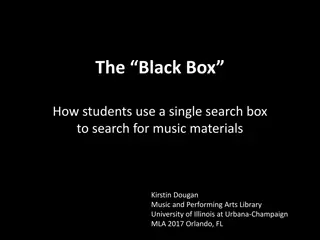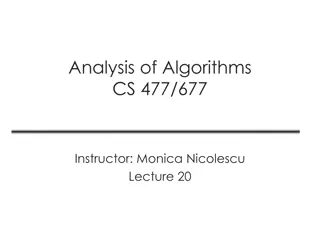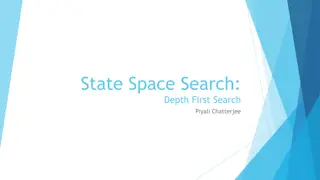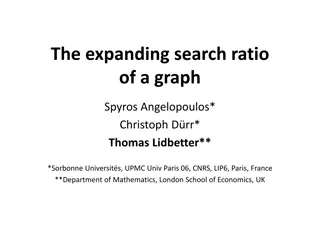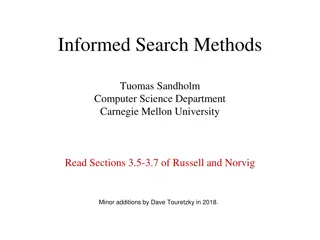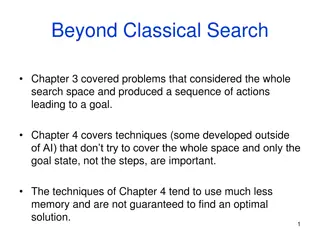Metaheuristic Algorithms: Search Strategies and Solution Space
Metaheuristics offer a direct search approach to finding solutions, bypassing mathematical models. By iteratively improving feasible solutions, these algorithms balance diversification and intensification. Understanding solution representation and neighborhood structures is key, as well as navigating complexity and landscapes in the search space. Starting with a heuristic search setup, considering solution quality vs. time trade-offs, and incorporating constraints are essential steps in metaheuristic problem-solving. Hybrid strategies combining greedy and random solutions often lead to efficient and effective outcomes.
Download Presentation

Please find below an Image/Link to download the presentation.
The content on the website is provided AS IS for your information and personal use only. It may not be sold, licensed, or shared on other websites without obtaining consent from the author.If you encounter any issues during the download, it is possible that the publisher has removed the file from their server.
You are allowed to download the files provided on this website for personal or commercial use, subject to the condition that they are used lawfully. All files are the property of their respective owners.
The content on the website is provided AS IS for your information and personal use only. It may not be sold, licensed, or shared on other websites without obtaining consent from the author.
E N D
Presentation Transcript
Det Nationale Videncenter for e-lring Adaptive Learning and Beyond
Det Nationale Videncenter for e-lring What is adaptive learning? No agreed-upon definition in the literature. Let's look at what adaptive learning systems do.
Det Nationale Videncenter for e-lring How do adaptive learning systems work? The currently most effective systems: Conduct initial diagnostic. Map out learning pathway. Provide appropriate learning content. Provide just for me, just in time, and just right feedback. Monitor and adapt. Hamilton & Hattie 2021 and Taylor et al. 2021
Det Nationale Videncenter for e-lring Does adaptive learning work? Adapting teaching to learners individual needs is well-documented to have positive effect on learning outcomes. Main components of many adaptive systems instruction, assessment, feedback and scaffolding have positive effect on learning. Adaptive learning technologies have potential to accelerate achievement . Akbulut & Cardak 2012, Hattie 2009 and Hamilton & Hattie 2021
Det Nationale Videncenter for e-lring Personalized learning to everyone everywhere at any time Adaptive learning technologies can Personalize and enhance learning by delivering content and provide immediate feedback and scaffolding based on individual learner performance and characteristics (e.g. prior knowledge). Reduce time spent learning. Provide learning to everyone everywhere and at any time through cloud services. Taylor 2021
Det Nationale Videncenter for e-lring Knowledge and skills but competency? Many of the most effective adaptive systems adapt based on outcomes of standardized tests (eg. multiple choice). Can we assess all relevant learning through tests? Knowledge and to some extent skills yes. But what about competencies, i.e. the ability assume responsibility, act independently and apply knowledge and skills in a real life situation? Hamilton & Hattie 2021 and Martin et al 2020
Det Nationale Videncenter for e-lring Critical thinking and creativity? STEM is the most common knowledge domain used in adaptive learning systems. Arts, design and social sciences are underrepresented. Why? Maybe because STEM subjects have quantifiably right/wrong answers while social sciences use many open-ended questions. How can you assess creativity and critical thinking through a standardized test? Martin et.al 2020, Xie et al 2019 and Hamilton & Hattie 2021
Det Nationale Videncenter for e-lring Delivered, not sought out An important competency in modern society is the ability to actively seek relevant information from numerous possible sources and critically evaluate its validity. Many adaptive learning systems passively deliver content from a fixed, finite knowledge base. How can adaptive learning systems support critical information seeking?
Det Nationale Videncenter for e-lring Inferred and obscure, not controllable and transparent Effective learning is visible, and learners often want to control their learning environment. Adaptive learning systems adapt according to indirectly inferred learner needs and preferences, that the leaner hasn't directly communicated and isn t aware of or in control of. Should the adaptation process be transparent? And who should control it? The system or the learner? Hattie 2009 and Shute & Zapata-Rivera 2012
Det Nationale Videncenter for e-lring Robust learner modeling? Most adaptive learning systems model learner characteristics (e.g. prior knowledge) and adapt accordingly. The most used characteristic is learning styles. Learning styles have being extensively studied but their educational value and reliability when measured seem to lack empirical support. Can we trust systems based on controversial theories of learner characteristics? Martin et.al 2020, Xie et al 2019 and Akbulut & Cardak 2012
Det Nationale Videncenter for e-lring Now we would like input to the subject from you :) Go to: www.padlet.com/daha2/adaptive Write your thoughts on the three subjects. We ll meet back here in 10 min. Notice changes/text are automatically saved
Det Nationale Videncenter for e-lring Adaptive learning and education Learning and teaching are dynamic processes. A solid history of several pedagogical approaches and views on learning Education is not only bound to subject matter and academic content but often contains a focus on the learners well-being, socialization, citizenship, democratic processes, values, formation (Bildung). Which learning views are adaptive systems built on and which dimensions of learning can they support?
Det Nationale Videncenter for e-lring What does it take to learn in formal education? Laurillard (2016). Adopted from presentation by Diana Laurillard.
Det Nationale Videncenter for e-lring Other considerations in regard to adaptive learning systems The use of adaptive learning systems influence the formal education system: Private organizations offer complex tailored learning systems Role of the teacher Transparency Data and use of data. "Who owns the data, an [sic] adaptive learning system produces, and what can and should this data be used for?"(Gynther 2016)
Det Nationale Videncenter for e-lring Questions to consider when talking adaptive learning Can adaptive learning systems stand alone in teaching and education? Where is the social dimension when using adaptive systems? Do we know the values and methods the systems are based on? Does the learner? Is it important? How can we make the best use of adaptive systems in formal education?
Det Nationale Videncenter for e-lring References Akbulut, Y. & Cardak, C.S. (2011). Adaptive educational hypermedia accommodating learning styles: A content analysis of publications from 2000 to 2011, Computers & Education, Volume 58, Issue 2, Pages 835-842. Gynther, K. (2016). Design Framework for an Adaptive MOOC Enhanced by Blended Learning: Supplementary Training and Personalized Learning for Teacher Professional Development. The Electronic Journal of e-Learning, Volume 14, Issue 1, Pages 15-30. Hamilton, A. & Hattie, J. (2021). Not All That Glitters Is Gold: Can Education Technology Finally Deliver? Corwin Press, Inc. Hattie, J. (2009). Visible learning: A synthesis of over 800 meta-analyses relating to achievement. Routledge.
Det Nationale Videncenter for e-lring References Laurillard, D (2012). Teaching as a Design Science, ch. 11, Routledge. Martin, F., Chen, Y., Moore, R.L., & Westine, C. (2020). Systematic review of adaptive learning research designs, context, strategies, and technologies from 2009 to 2018. Educational Technology Research & Development, Volumen 68, Issue 4, Pages 1903-1929. Shute, V., & Zapata-Rivera, D. (2012). Adaptive Educational Systems. In P. Durlach & A. Lesgold (Eds.), Adaptive Technologies for Training and Education, Pages 7-27. Cambridge: Cambridge University Press. Taylor D.L., Yeung M., Bashet A.Z. (2021) Personalized and Adaptive Learning. In: Ryoo J., Winkelmann K. (eds) Innovative Learning Environments in STEM Higher Education. SpringerBriefs in Statistics. Springer, Cham.
Det Nationale Videncenter for e-lring References Xie, H., Chu, H.-C., Hwang, G.-J., & Wang, C.-C. (2019). Trends and development in technology-enhanced adaptive/personalized learning: A systematic review of journal publications from 2007 to 2017, Computers & Education, Volume 140,103599.
